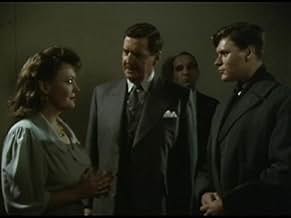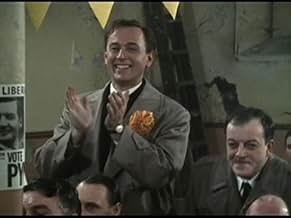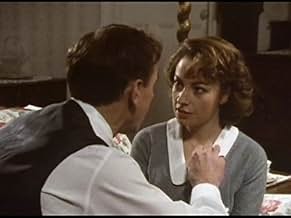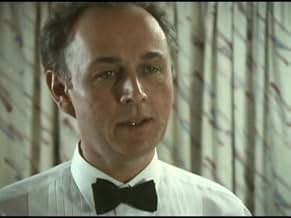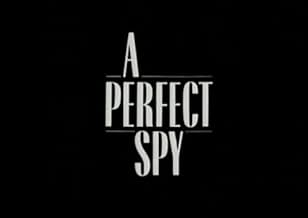A Perfect Spy
- Mini-série télévisée
- 1987
- 6h 14min
NOTE IMDb
7,3/10
1,1 k
MA NOTE
L'ascension et la chute de Magnus Pym et sa carrière dans le renseignement. Des rencontres fortuites avec des personnes qui seront importantes pour lui à l'avenir à une vie en Tchécoslovaqui... Tout lireL'ascension et la chute de Magnus Pym et sa carrière dans le renseignement. Des rencontres fortuites avec des personnes qui seront importantes pour lui à l'avenir à une vie en Tchécoslovaquie.L'ascension et la chute de Magnus Pym et sa carrière dans le renseignement. Des rencontres fortuites avec des personnes qui seront importantes pour lui à l'avenir à une vie en Tchécoslovaquie.
- Nommé pour 2 Primetime Emmys
- 1 victoire et 6 nominations au total
Parcourir les épisodes
Avis à la une
I clearly missed the joke behind this series. How does a man so gullible climb his way through the ranks of British intelligence? Maybe that was Le Carré's point; that any idiot could have been "a spy" during the cold war, and that it was exactly his stupidity that kept him unwittingly "under the radar"...Either way, I came away feeling extremely annoyed at the end.
This is my second time through for A Perfect Spy. I watched it 2 or 3 years ago and liked it. I like it still. It's natural that it gets compared to the beeb's other big Le Carre' series, Tinker Tailor Soldier Spy. Tinker Tailor focuses on the "game" spies play; Perfect Spy gives us the other axis - what kind of person a spy is. There are a number of themes that these movies share, along with others in the genre.
Ambiguity - moral, sexual, interpersonal - which creates a multidimensional space of true vs. false, inside vs. outside, love vs. responsibility. In a way, these characters are happiest when they are being treated the most shabbily by those they love and respect - "backstabbed" in its various nuances.
The theme of fathers and father-figures is also important. One of the most intriguing characters in A Perfect Spy is Rick, the main character Magnus' perhaps ersatz father. Throughout the story he betrays and is betrayed. A rogue who always manages to climb back up the ladder when he's been toppled, who seems impervious to what others think of him, asks Magnus each time they meet, "Do you love your old man?" and never, "Do you love me?" Maybe it says this somewhere else, but A Perfect Spy is a love story.
Another theme is that of malignancy. The nature of the business is to turn others - turn them against their government, against their friends and associates, turn them against their values and beliefs. In each of the Le Carre' movies I have seen, The Spy who Came in From the Cold, Looking Glass War, Tinker Tailor Soldier Spy, Smiley's People, and A Perfect Spy, turning and being turned is the foundation of the tragedy.
Finally, not so much a theme as an artistic touch - in each of these films there is usually only a single gun shot, or perhaps two shots bookending the story. Violence, torture, cruelty are always just beneath the surface. We see their results not as streams of blood or dank prison cells but in the the objects Le Carre''s characters cling to as they are ineluctably sucked down into the morass.
If you haven't seen the films above, and you enjoy A Perfect Spy, you are in for a treat. I'd also recommend The Sandbagger series (Yorkshire TV), the 2nd and 3rd seasons of which begin to reach the level of this kind of complexity. The IPCRESS File and Burial in Berlin are nice, though light weight. For political intrigue try A Very British Coup, House of Cards and Yes, Minister/Yes, Prime Minister.
If only a brit would set his hand to making The Three Kingdoms - there would be a film with intrigue and complexity.
Ambiguity - moral, sexual, interpersonal - which creates a multidimensional space of true vs. false, inside vs. outside, love vs. responsibility. In a way, these characters are happiest when they are being treated the most shabbily by those they love and respect - "backstabbed" in its various nuances.
The theme of fathers and father-figures is also important. One of the most intriguing characters in A Perfect Spy is Rick, the main character Magnus' perhaps ersatz father. Throughout the story he betrays and is betrayed. A rogue who always manages to climb back up the ladder when he's been toppled, who seems impervious to what others think of him, asks Magnus each time they meet, "Do you love your old man?" and never, "Do you love me?" Maybe it says this somewhere else, but A Perfect Spy is a love story.
Another theme is that of malignancy. The nature of the business is to turn others - turn them against their government, against their friends and associates, turn them against their values and beliefs. In each of the Le Carre' movies I have seen, The Spy who Came in From the Cold, Looking Glass War, Tinker Tailor Soldier Spy, Smiley's People, and A Perfect Spy, turning and being turned is the foundation of the tragedy.
Finally, not so much a theme as an artistic touch - in each of these films there is usually only a single gun shot, or perhaps two shots bookending the story. Violence, torture, cruelty are always just beneath the surface. We see their results not as streams of blood or dank prison cells but in the the objects Le Carre''s characters cling to as they are ineluctably sucked down into the morass.
If you haven't seen the films above, and you enjoy A Perfect Spy, you are in for a treat. I'd also recommend The Sandbagger series (Yorkshire TV), the 2nd and 3rd seasons of which begin to reach the level of this kind of complexity. The IPCRESS File and Burial in Berlin are nice, though light weight. For political intrigue try A Very British Coup, House of Cards and Yes, Minister/Yes, Prime Minister.
If only a brit would set his hand to making The Three Kingdoms - there would be a film with intrigue and complexity.
Without doubt the best of the novels of John Le Carre, exquisitely transformed into a classic film. Performances by Peter Egan (Magnus Pym, The Perfect Spy), Rudiger Weigang (Axel, real name Alexander Hampel, Magnus' Czech Intelligence controller), Ray McAnally (Magnus' con-man father) and Alan Howard (Jack Brotherhood, Magnus' mentor, believer and British controller), together with the rest of the characters, are so perfect and natural, the person responsible for casting them should have been given an award. Even the small parts, such as Major Membury, are performed to perfection. It says a lot for the power of the performances, and the strength of the characters in the novel that, despite the duplicity of Magnus, one cannot help but feel closer to Magnus and Axel than to Jack Brotherhood and the slimy Grant Lederer of U.S. Intelligence. I have read the book at least a dozen times, and watched the movie almost as many times, and continue to be mesmerized by both. If I had one book to take on a desert island, A Perfect Spy would be the choice above all others.
There is a brilliant lesson of sorts here about narrative depth, but you must know the book. Lavishly conceived by Le Carre as his magnum opus, the book is not any other spy thriller you picked up on an airport, it's one of the most tantalizing I know. The center is this, a mysterious man, posing as someone else, is holed up in a small room in Dorset overlooking the ocean and recalls a whole journey through life.
The childhood stream-of-consciousness where he attempts to be Faulkner without conquering the madness doesn't work; so much else does. It has a strong sense of presence in several places from Greek islands to Washington, the center of control. It has a sense of anxious premonition about the extents of control. It has a narrator writing a memoir while efforts are underway to apprehend him before he defects to the other side. It has several relationships of ambiguous love defined in his imagination. It has a disappearance in the middle of the night and a strange encounter in a Czech barn.
This, it just won't do.
The most glaring fault by far is that they simplified the structure, making it a linear telling in one go (practically). The childhood segment works even less because when seen, it loses the shroud of memory. Seeing Rick is never going to be as powerful as sensing him move through room's of the son's memory. It still covers most of the narrative ground but we lose the premonition, we lose the mystifying sense of machinery set in motion long ago and discovered only when the ground beneath our feet shifts, we lose the depth of the betrayal of love. We lose it all and get a nicely groomed play. Its idea of profound emotion is actors grimacing in close up; I was stunned to see that it's from the late 80s, it looks 20 years older.
I don't know if this is watchable fiction, maybe it is, but it's a complete catastrophe where it should go beyond it and give us lives, contact, sense, everything Le Carre strove to have it slide through portals of remembrance is reduced to the Cliff notes version.
But something weird happens. To see this and to have known the book is to have images of something I've known as deeper, more elusive, more rending and this, for me, was to recall even the book as deeper than Le Carre managed with words. A powerful scene in the film exemplifies just this, when his wife, alarmed by events, begins to read an unfinished manuscript he's left behind, ostensibly a novel he's writing (he says), but she suspects it's more, we know it's more, it's the disguised recollections of a lifetime (this is completely flattened in this linear telling).
She cries as she reads about betrayal as hope, as salvation, as an adventure for the imaginative soul, but oh how much more maddeningly full is the life behind the words. His wife, his mentor in the service, will they ever truly know? To know this is to realize how much we won't truly know in turn. There's only so much you can say and so easy to misunderstand. What Le Carre doesn't put to words around this life deserves its Tarkovsky film.
The childhood stream-of-consciousness where he attempts to be Faulkner without conquering the madness doesn't work; so much else does. It has a strong sense of presence in several places from Greek islands to Washington, the center of control. It has a sense of anxious premonition about the extents of control. It has a narrator writing a memoir while efforts are underway to apprehend him before he defects to the other side. It has several relationships of ambiguous love defined in his imagination. It has a disappearance in the middle of the night and a strange encounter in a Czech barn.
This, it just won't do.
The most glaring fault by far is that they simplified the structure, making it a linear telling in one go (practically). The childhood segment works even less because when seen, it loses the shroud of memory. Seeing Rick is never going to be as powerful as sensing him move through room's of the son's memory. It still covers most of the narrative ground but we lose the premonition, we lose the mystifying sense of machinery set in motion long ago and discovered only when the ground beneath our feet shifts, we lose the depth of the betrayal of love. We lose it all and get a nicely groomed play. Its idea of profound emotion is actors grimacing in close up; I was stunned to see that it's from the late 80s, it looks 20 years older.
I don't know if this is watchable fiction, maybe it is, but it's a complete catastrophe where it should go beyond it and give us lives, contact, sense, everything Le Carre strove to have it slide through portals of remembrance is reduced to the Cliff notes version.
But something weird happens. To see this and to have known the book is to have images of something I've known as deeper, more elusive, more rending and this, for me, was to recall even the book as deeper than Le Carre managed with words. A powerful scene in the film exemplifies just this, when his wife, alarmed by events, begins to read an unfinished manuscript he's left behind, ostensibly a novel he's writing (he says), but she suspects it's more, we know it's more, it's the disguised recollections of a lifetime (this is completely flattened in this linear telling).
She cries as she reads about betrayal as hope, as salvation, as an adventure for the imaginative soul, but oh how much more maddeningly full is the life behind the words. His wife, his mentor in the service, will they ever truly know? To know this is to realize how much we won't truly know in turn. There's only so much you can say and so easy to misunderstand. What Le Carre doesn't put to words around this life deserves its Tarkovsky film.
As a fan of author John le Carre I've slowly been working my way through both his books and the adaptations of them. I found this 1987 adaptation of le Carre's masterwork at my local library and sat down to watch it thinking I would know what to expect. I was surprised to discover that my expectations were exceeded in this miniseries, a fine cross between a spy thriller and a human drama.
Peter Egan gives a great performance as Magnus Pym, the perfect spy of the title. Carrying on in the long tradition of le Carre's strong main characters, Pym is also quite possibly the best. Egan plays Pym (who in fact contains many shades of author le Carre) as a man forced to spend his entire life lying and betraying sometimes out of circumstance and other times just to survive with the consequence of him becoming "a perfect spy". Egan plays Pym to perfection as a man always on the run, if not from others then from himself. Egan alone makes the six or so hours of this miniseries worth seeing from his performance alone.
Surronding Egan is a fantastic supporting cast. Ray McAnally gives one of his finest performances as Pym's con man father Rick who (as le Carre has said) is based strongly on the author's own father. McAnally plays a man who comes in and out of Pym's life and is one of the those responsible for Pym becoming "a perfect spy". In fact if it wasn't for McAnally's performance a year after this in A Very British Coup this would the finest performance of his sadly too short career.
The rest of the supporting is excellent as well. From Caroline John as Pym's mother to Alan Howard as his spy mentor to Rüdiger Weigang as the young Pym's friend turned controller to Jane Booker as Pym's wife the supporting cast is fantastic. Special mention should be made of the three young actors who played the younger Pym (Jonathan Haley, Nicholas Haley and Benedict Taylor) who establish the young man who would become the man played so well By Peter Egan.
The production values of the miniseries are strong as well. As the miniseries adaptations of Tinker, Tailor, Soldier, Spy and Smiley's People proved these stories can only be told in miniseries format. The locations are excellent from the English locations to the those scattered across Eastern Europe and the USA as are the sets by Chris Edwards. The cinematography of Elmer Cossey adds an extra layer of realism to the world of the miniseries. Yet the highlight of the miniseries is really the script.
Screenwrtier Arthur Hopcraft tackled the job of adapting the six hundred or so page novel excellently. The novel was largely (at least in its early parts) autobiographical in that Pym's early life echoed much of John le Carre's life. The script for this miniseries is no exception as it traces the development of Magnus Pym from young boy to "a perfect spy". Never once does the miniseries deviate from its purpose of telling a fine human drama in the context of the world of espionage. If one ever wants proof that a spy thriller can be tense and fascinating without ever having one gun fight, fist fight, or James Bond style car chase this would be the proof. While the miniseries is six plus hours long it never wastes a moment and it all the better for it.
Though it might be overlong for some for those who don't have very short attention spans here is a must see. From the performances of Peter Egan and Ray McAnally to fine production values and a fine literary script A Perfect Spy is one of the finest miniseries who can expect to see. It is a fascinating trip down the history of the Cold War yet it is more then that. It is also a trip down what John le Carre has called "the secret path": the path of the spy the man who must lie and betray to survive. As much a human drama as a spy thriller A Perfect Spy isn't to be missed.
Peter Egan gives a great performance as Magnus Pym, the perfect spy of the title. Carrying on in the long tradition of le Carre's strong main characters, Pym is also quite possibly the best. Egan plays Pym (who in fact contains many shades of author le Carre) as a man forced to spend his entire life lying and betraying sometimes out of circumstance and other times just to survive with the consequence of him becoming "a perfect spy". Egan plays Pym to perfection as a man always on the run, if not from others then from himself. Egan alone makes the six or so hours of this miniseries worth seeing from his performance alone.
Surronding Egan is a fantastic supporting cast. Ray McAnally gives one of his finest performances as Pym's con man father Rick who (as le Carre has said) is based strongly on the author's own father. McAnally plays a man who comes in and out of Pym's life and is one of the those responsible for Pym becoming "a perfect spy". In fact if it wasn't for McAnally's performance a year after this in A Very British Coup this would the finest performance of his sadly too short career.
The rest of the supporting is excellent as well. From Caroline John as Pym's mother to Alan Howard as his spy mentor to Rüdiger Weigang as the young Pym's friend turned controller to Jane Booker as Pym's wife the supporting cast is fantastic. Special mention should be made of the three young actors who played the younger Pym (Jonathan Haley, Nicholas Haley and Benedict Taylor) who establish the young man who would become the man played so well By Peter Egan.
The production values of the miniseries are strong as well. As the miniseries adaptations of Tinker, Tailor, Soldier, Spy and Smiley's People proved these stories can only be told in miniseries format. The locations are excellent from the English locations to the those scattered across Eastern Europe and the USA as are the sets by Chris Edwards. The cinematography of Elmer Cossey adds an extra layer of realism to the world of the miniseries. Yet the highlight of the miniseries is really the script.
Screenwrtier Arthur Hopcraft tackled the job of adapting the six hundred or so page novel excellently. The novel was largely (at least in its early parts) autobiographical in that Pym's early life echoed much of John le Carre's life. The script for this miniseries is no exception as it traces the development of Magnus Pym from young boy to "a perfect spy". Never once does the miniseries deviate from its purpose of telling a fine human drama in the context of the world of espionage. If one ever wants proof that a spy thriller can be tense and fascinating without ever having one gun fight, fist fight, or James Bond style car chase this would be the proof. While the miniseries is six plus hours long it never wastes a moment and it all the better for it.
Though it might be overlong for some for those who don't have very short attention spans here is a must see. From the performances of Peter Egan and Ray McAnally to fine production values and a fine literary script A Perfect Spy is one of the finest miniseries who can expect to see. It is a fascinating trip down the history of the Cold War yet it is more then that. It is also a trip down what John le Carre has called "the secret path": the path of the spy the man who must lie and betray to survive. As much a human drama as a spy thriller A Perfect Spy isn't to be missed.
Le saviez-vous
- AnecdotesAccording to source novelist John le Carré, the character of Rick Pym (Ray McAnally) is heavily based upon his own father.
- ConnexionsFeatured in Wogan: Épisode #9.10 (1989)
Meilleurs choix
Connectez-vous pour évaluer et suivre la liste de favoris afin de recevoir des recommandations personnalisées
- How many seasons does A Perfect Spy have?Alimenté par Alexa
Détails
Contribuer à cette page
Suggérer une modification ou ajouter du contenu manquant

Lacune principale
By what name was A Perfect Spy (1987) officially released in India in English?
Répondre






